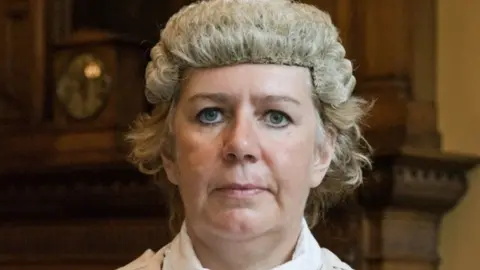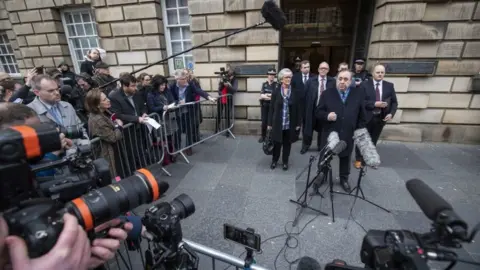Behind the scenes of the Alex Salmond trial
 PA Media
PA MediaAfter a political career spanning 30 years, Alex Salmond will be more familiar than most with the feeling of sitting waiting for a result to come in. But never one quite like this.
This time, the constituency passing judgement on the former first minister was a jury of the High Court in Edinburgh.
And rather than a seat in parliament or the outcome of a referendum, his very freedom was on the line.
It wasn't just Mr Salmond waiting for a result.
Nine women also sat nervously awaiting the outcome, to see if their accounts of sexual assault would be believed beyond all reasonable doubt.
When the foreman of the jury stood up and announced that Mr Salmond had been cleared of all charges, the former first minister reacted the way he had throughout the trial - by not reacting.
He calmly thanked the judge as she told him he was free to go, and walked from the courtroom.

The jury's six total hours of deliberation were preceded by nine days of evidence, with witnesses being questioned by prosecution and defence lawyers amid intense media scrutiny.
All of it was presided over by Lady Dorrian, Scotland's second most senior judge.
While always fair, she was also scrupulously firm. Lawyers who pushed at the boundaries of what could reasonably be relevant to the case were steered firmly back into line. Witnesses who strayed into hearsay or speculation were stopped dead in their tracks.
The lawyers leading the two opposing sides were both titans of the court, vastly experienced operators - but could scarcely have been more different in style.
 PA Media
PA MediaProsecutor Alex Prentice, the advocate depute, was all precision, referring to a huge stack of notes and delivering clipped, precise questions.
There was a noticeable pattern to his approach - each woman was asked the exact same things about whether they consented to or invited the former first minister's alleged advances - as Mr Prentice painstakingly built his case.
Defence lawyer Gordon Jackson, meanwhile, barked out his questions gruffly, darting from one subject to the next; "let's move on" he would growl, leaving his scepticism about the answers hanging heavy in the air.
"The Dean", as many including Lady Dorrian called him in reference to his position atop the Faculty of Advocates, was loath to stand still behind a lectern as he pursued his quarry.
He ranged around the courtroom, wig askew, as he mused on the quality of evidence.
This wandering was apparent even when the Crown was taking the lead - at one point he popped up at the back of the press room, watching Alex Prentice's questions on a monitor amid a pack of slightly startled journalists.
 PA Media
PA MediaFor his part, Mr Salmond sat placidly in the dock throughout. He occasionally called Mr Jackson over to suggest a certain question, but for the most part seemed content to watch.
At the end of each day's evidence he would share a joke and some hand sanitiser with one of the security officers before walking out with a calm smile carefully fixed on his face.
The assembly of journalists seated directly behind him peered through the plexiglass screen, seeking in vain for some flicker of emotion.
But at most you would occasionally catch him rocking gently from side to side during particularly difficult moments, like when he was waiting for the jury to troop back in with their verdict.
When he came to give evidence, there was little of the showmanship which characterised his approach to politics. This was a more reserved Alex Salmond, acutely aware of the difficulty of his position.
He did deploy the old politician's trick of turning his opponents own quotes back on them, reading back his own notes of evidence from the complainers as Mr Jackson guided him along, but he rarely strayed into speechifying.
 PA Media
PA MediaAlex Prentice borrowed a trick from politics himself with a Paxman-style opening to cross examination, posing the same question four or five times - had Mr Salmond considered the feelings of one of the complainers? - in increasingly icy tones.
But for all the former FM was irritated, heaving a sigh into his microphone, his composure did not crack.
The nine women named in the charges gave evidence in a closed court, a screen separating them from Mr Salmond and the media decamped to a neighbouring room with a video feed.
Their testimony was picked over in occasionally excruciating detail, by both prosecution and defence.
Shelagh McCall QC - in theory the defence's junior counsel, but one so senior in her field that the title seems laughable - led the cross-examination of several, but both she and Mr Jackson found themselves well matched.
Often, their attempts to pull apart the stories of the complainers only brought out even more eye-catching testimony. For example the much-discussed system where female civil servants were supposedly not allowed to work alone with Mr Salmond in the evening first came out in cross examination.
This, combined with the limits placed on the questioning of complainers in sex offences trials, meant cross-examination often seemed to fly by in a trial which ended up lasting for only half as long as it was originally scheduled for.
 PA Media
PA MediaIt felt slightly odd to be inside the bubble of the court as the coronavirus story took off outside. At first, a bottle of hand sanitiser appearing in the media room was as much acknowledgement as it got, but as breaking news alerts popped up on everyone's phones the shadow of the virus steadily grew over the court.
Every morning we would nervously count the jurors in, to make sure there were still 15. Eventually their number would drop to 13, although Lady Dorrian stressed there were "various reasons" for that.
Mr Jackson spent the better part of the trial coughing and spluttering; at one point he paused to reassure the jury that he had had his cough for "about six weeks" so there was no need for him to go into self-isolation.
One of his witnesses did, however, and was unable to attend court.
Lady Dorrian spoke about these being "difficult times", but was apparently absolutely determined to see the trial through. She was even rumoured to have been contemplating a Saturday sitting at one point.
Ultimately it feels like there is little room for analysis or evaluation of the arguments actually made in court. In general, we accept the verdict of the jury in absolute terms; they pronounce an accused guilty because he is guilty, not because of the particular skill of the prosecution. They pronounce him innocent because his guilt has not been proved, not because his defence team have yanked him from the fire.
This trial is no different. This does not mean there will be no debate or discussion off the back of it all - far from it, and even Mr Salmond spoke outside court of there being more to say once the coronavirus crisis has eased.
Testimony heard in the court has raised questions for the Scottish government, for the SNP, and for Nicola Sturgeon.
But those will be addressed in the political arena, not the legal one. As far as the court is concerned, the Alex Salmond trial is over.
